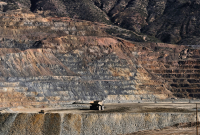Support strong Canadian climate journalism for 2025
Sitting on the Bay of Fundy, one of the seven wonders of North America, is the Point Lepreau Nuclear Generating Station. New Brunswick Power hopes it will remain there a good long time: the company has asked for an unprecedented 25-year licence extension, prompting pushback during a recent round of public hearings.
Coming into operation in the 1980s, the station is one of four in Canada and the only nuclear power station outside of Ontario. Consisting of a singular CANDU reactor, a heavy-water reactor that generates power, Point Lepreau’s current licence renewal is reaching a close, so the Canadian Nuclear Safety Commission (CNSC) is required to grant a new one. The current term is five years, as was the one before that.
The request to operate until 2047 has raised concerns from numerous people, who say a shorter licence should be granted instead, and during that time, NB Power should focus on a decommissioning plan. So far, the CNSC has suggested a 20-year extension but will release its final decision before June 30, when the current licence expires. If the commission deems more information is needed, it could grant a short extension while deliberating, a spokesperson told Canada’s National Observer.
Many environmentalists oppose nuclear plants of any sort, insisting they stand in the way of cleaner and more sustainable renewable energy, such as wind. Although the CANDU reactor doesn’t directly produce carbon dioxide like oil or gas, the process produces harmful nuclear waste, and opponents say the cost and risk make it a poor solution to the climate crisis.
The concern around waste is top of mind for one Indigenous community — the Passamaquoddy, whose traditional territory includes Point Lepreau where the nuclear reactor is sited. Chief Hugh Akagi said at a public hearing in Saint John last week that a three-year extension would be more reasonable. As an intervenor through the Passamaquoddy Recognition Group (PRG), Akagi is deeply concerned about the nuclear waste resulting from the reactors. Nuclear waste is currently stored at Point Lepreau but will need to be moved elsewhere in the future. He notes there is no plan for long-term storage; the Nuclear Waste Management Organization is currently responsible for finding somewhere to bury the spent fuel but needs to convince a community to take on the responsibility.
The Passamaquoddy Tribe spans across New Brunswick and Maine’s borders and are a federally recognized group in the States but not in Canada. Although they don’t have First Nations status, the Passamoquoddy in New Brunswick have a government and have been seeking recognition for decades.
The nation wasn’t consulted about storing nuclear waste on its land, which goes against the United Nations Declaration on the Rights of Indigenous Peoples Act (UNDRIP), the PRG stated. It pointed to Article 29.2, which says: “States shall take effective measures to ensure that no storage or disposal of hazardous materials shall take place in the lands or territories of Indigenous peoples without their free, prior and informed consent.”
“I seek only what is just; we have never been consulted,” Akagi said.
“A voice has been left out. In the case of the hearings, ignored. To ask to be part of any decisions moving forward would require a quantum leap of faith after reviewing the previous track record of this country with Indigenous peoples,” he added.
Mi'kmaq First Nations group Mi'gmawe'l Tplu'taqnn Incorporated requested a five- to 10-year licence, and echoed requests for Indigenous Nations to be involved in decisions around Point Lepreau.
Another issue raised was the high levels of tritium, a radioactive substance released by CANDU reactors at Point Lepreau. Tritium levels have doubled over the past six or seven years to four times the amount released by Ontario’s Darlington station. Radiation expert Ian Fairlie submitted a report on behalf of the PRG, who noted tritium levels surrounding the site are not adequately tested, which is worrying because the substance is carcinogenic.
CNSC president Rumina Velshi asked NB Power why tritium levels have been steadily going up since 2017. Representatives from NB Power said things like preventive maintenance have caused tritium levels to rise and that they’re aware of the levels, which are not higher than allowed. Jason Nouwens, NB Power’s director of regulatory and external affairs, said the utility is in the “early design stages” of upgrading its moderators, which will keep tritium at a “low level.”
The Coalition for Responsible Energy Development (CRED-NB) also spoke during the three-day hearings — the group was concerned with the lack of consultation and public participation, plans around small modular nuclear reactors (SMRs) and cybersecurity.
In a subsequent interview, Gail Wylie with CRED-NB highlighted the group’s concerns around the ingestion planning zone, which is the area close to the plant that requires special planning in case of an accident — such as bans on food and water consumption. Point Lepreau’s current ingestion planning zone is 57 kilometres, but Wylie said the International Atomic Energy Agency suggests a zone of 300 kilometres, an area which would include all of New Brunswick along with parts of Prince Edward Island, Nova Scotia and Maine.
According to Wylie, NB Power’s expert said the larger zone is for light-water reactors rather than heavy-water ones like the CANDU. Since then, Gordon Edwards, nuclear expert and co-founder of the Canadian Coalition for Nuclear Responsibility, has said it's the amount of radioactivity not the type of reactor that should be the determining factor.
Which means Point Lepreau should have a larger zone, Wylie argued, noting the lack of cross-examination on topics like this make the process flawed.
Numerous intervenors submitted written statements and spoke in favour of the 25-year licence request. Groups such as Atlantica Centre for Energy (part of its mission statement is “to help realize opportunities associated with energy resources in Atlantic Canada”) and self referred “heart of the pro-nuclear movement,” Generation Atomic (based in the U.S.) spoke at the hearings.
NB Power, which is a Crown corporation owned by the province of New Brunswick, said it values all feedback from the hearings and is dedicated to continuously improving operations at Point Lepreau.
“While we’re confident in our request based upon our well-established record of safe operations, we recognize the Commission has the absolute right to grant a licence,” reads a statement from the utility.
“If the Commission seeks changes in our application, we will certainly take their guidance and address any questions or concerns they may have.”






Comments
How much heat does waste nuclear fuel create? And is Canada’s research into nuclear power such as small or molten salt nuclear, considering developing a new nuclear power source which uses the waste from our existing power plants.
Thank you for providing thoughtful, critical coverage of this issue rather than the usual promotional material from the nuclear industry. Decisions about the future sources of energy are crucial and we need all information to make informed decisions.